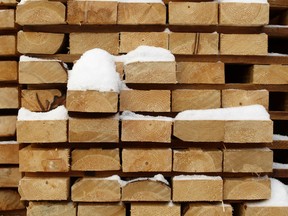Thu, August 4, 2022

WASHINGTON — Lower than expected U.S. penalties on softwood lumber exports from Canada are doing little to temper the dismay of the federal government in Ottawa.
International Trade Minister Mary Ng is calling the latest duties "baseless," "unwarranted" and "unfair."
The key final rate of 8.59 per cent is significantly lower than the current rate of 17.91 per cent, as well as the 11.64 per cent proposed in a preliminary decision issued earlier this year.
But Ng says the duties are unjustified no matter the level, and will cause undue hardship to both Canada's forestry industry and consumers in the U.S.
She says Ottawa will challenge the latest finding under the U.S.-Mexico-Canada Agreement's dispute resolution system.
Ng is nonetheless leaving the door open to a resolution to the years-long dispute, which some U.S. lawmakers and observers have been calling for to help ease record levels of inflation south of the border.
"Canada has always been willing to work with the United States to explore ideas that could allow for a return to predictable cross-border trade in softwood lumber," Ng said in a statement.
"We remain confident that a negotiated solution to this long-standing trade issue is in the best interests of both our countries, and we welcome an open dialogue with the Unites States to this end."
U.S. Trade Representative Katherine Tai has also said the U.S. is willing to talk — on one condition.
Tai wants Canada to address the provincial stumpage fee regime that American producers have long complained gives producers north of the border an unfair advantage — the core issue in a dispute that has persisted for decades.
Federal officials in Ottawa say Canada would never agree to such a fundamental change to the way a key Crown resource is managed before the two sides have even sat down.
"These duties have caused unjustified harm to the Canadian industry and its workers," Ng said.
"They also amount to a tax on U.S. consumers, exacerbating housing unaffordability at a time of increased supply challenges and inflationary pressures."
Lumber-producing provinces set so-called stumpage fees for timber harvested from Crown land — a system that U.S. producers, forced to pay market rates, say amounts to an unfair subsidy.
Democrat Sen. Bob Menendez of New Jersey and South Dakota Republican Sen. John Thune are among those who have been urging the Biden administration to provide further tariff relief on imports from Canada.
This report by The Canadian Press was first published Aug. 4, 2022.
Ana Monteiro and Jen Skerritt
Thu, August 4, 2022

(Bloomberg) -- Canada’s government said it will challenge US duties on softwood lumber, saying the tariffs have caused “unjustified harm” to the industry and workers.
“Canada is disappointed that the United States continues to impose unwarranted and unfair duties,” International Trade Minister Mary Ng said in a statement Thursday. “While the duty rates will decrease from the current levels for the majority of exporters, the only truly fair outcome would be for the United States to cease applying baseless duties.”
Ottawa will request dispute settlement through the US-Mexico-Canada trade agreement after the Commerce Department ruled it will keep in place levies on some imports, according to the statement.
The lumber-tariff challenge would be the latest to use a dispute-resolution mechanism in the USMCA agreement between the three nations, previously known as Nafta. Canada and the US have lodged a complaint over Mexico’s nationalist energy policy, while all three are engaged in a spat over car manufacturing.
The Trump administration imposed tariffs on Canadian softwood lumber in 2017, saying the industry is unfairly subsidized. The US raised rates on imports in 2021 even as an unprecedented rally lifted prices to record highs during a pandemic-fueled homebuilding and renovation boom.
Ng added that the tariffs “also amount to a tax on US consumers, exacerbating housing unaffordability at a time of increased supply challenges and inflationary pressures. US builders get more than a quarter of their lumber from Canada, the world’s largest softwood-lumber exporter.
The US Commerce Department on Thursday ruled that the new, combined “all others rate” that will apply to some Canadian softwood-lumber exports will drop to 8.59% from 17.91%.
Thu, August 4, 2022
WASHINGTON, Aug. 4, 2022 /PRNewswire/ -- The U.S. Department of Commerce today issued its final determination in the third annual review of softwood lumber imports from Canada. The total duty rate of 8.59% confirms yet again that Canadian lumber imports are unfairly traded into the U.S. market.
"The trade laws duties announced today by the Commerce Department will help offset Canada's unfair trade practices," said Andrew Miller, Chairman of the U.S. Lumber Coalition and CEO of Stimson Lumber. "The benefit of the trade cases against Canada are clear," added Miller. "Trade law enforcement boosts American manufacturing and results in more U.S. lumber being produced by U.S. workers to build U.S. homes."
U.S. sawmills have invested heavily to expand capacity since the trade cases were filed in 2016. The domestic industry has produced an additional 15 billion board feet of lumber through 2021, averaging 3 billion a year of additional output. This is enough lumber to build over 1 million single-family homes.
The U.S. Lumber Coalition supports the continued enforcement of the U.S. trade laws to strengthen domestic supply chains by allowing American companies to invest and increase the overall supply of made-in-America lumber and will continue to aggressively pursue the enforcement of the trade laws.
The U.S. industry remains open to a new U.S.–Canada softwood lumber trade agreement if and when Canada can demonstrate that it is serious about negotiations for an agreement that addresses Canada's unfair trade practices which are harming U.S. producers, workers, and timberland holders. Until then, the U.S. Lumber Coalition fully supports the continued strong enforcement of the U.S. trade laws to address Canada's unfair softwood lumber trade practices.
About the U.S. Lumber Coalition
The U.S. Lumber Coalition is an alliance of large and small softwood lumber producers from around the country, joined by their employees, and woodland owners, working to address Canada's unfair lumber trade practices. Our goal is to serve as the voice of the American lumber community, and effectively address Canada's unfair softwood lumber trade practices, including its gross underpricing of timber. For more information, please visit the Coalition's website at www.uslumbercoalition.org.





 Minister of Industry Melanie Joly rises during question period in the House of Commons on Parliament Hill in Ottawa on Friday, Sept. 26, 2025. THE CANADIAN PRESS/Justin Tang
Minister of Industry Melanie Joly rises during question period in the House of Commons on Parliament Hill in Ottawa on Friday, Sept. 26, 2025. THE CANADIAN PRESS/Justin Tang









.jpg)
